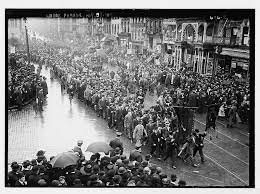My NYC311 phone app reminded me yesterday that NYCASP rules ("Alternate Side of the Street Parking") will be suspended today in observance of Labor Day. It is refreshing to be reminded that we still celebrate holidays, and that Labor Day is still one of them. I am actually old enough to remember when holidays were actually observed on their own terms, and when Labor Day was not just another "long weekend," an end-of-summer celebration of whatever, but actually honored human labor and the political, social, and cultural accomplishments of America's organized working men and women.
Notwithstanding the morally repugnant and politically disastrous "unholy" alliance of some contemporary Catholics with the Republican party, one of the more admirable aspects of the history of the Catholic Church in the United States, at least until relatively recently, has been the Church's commitment to the dignity of work and workers, and her support for unions and the labor movement. Institutionally this can be traced back explicitly to Cardinal Gibbons' famous February 20, 1887, Memorial to the Holy See supporting the Knights of Labor.
On that occasion, Cardinal Gibbons spoke frankly of the "grave and threatening social evils, public injustices, which call for strong resistance and legal remedy." He noted "that for the attainment of any public end, association - the organization of all interested persons - is the most efficacious means, a means altogether natural and just ... almost the only means to invite public attention, to give force to the most legitimate resistance, to add weight to the most just demands." To the (then more worrisome) objection that organized labor involved Catholics mixing with non-Catholics, he pointed out the obvious fact that they are mixed "precisely as they are at their work; for in a mixed people like ours, the separation of religious in social affairs is not possible." Gibbons also defended strikes as "a means almost everywhere and always resorted to by employees in our land and elsewhere to protest against what they consider unjust and to demand their rights." He also pointed out how "it is absolutely necessary that religion should continue to hold the affections, and thus rule the conduct of the multitudes," and how supremely important it is "that the Church should always be found on the side of humanity, of justice toward the multitudes who compose the body of the human family." Accordingly, he warned of "the evident danger of the Church's losing in popular estimation her right to be considered the friend of the people" and warned against an alternative policy as a result of which may "of the most devoted children of the Church would believe themselves repulsed by their Mother and would live without practicing their religion." In this, he proved especially prescient!


No comments:
Post a Comment